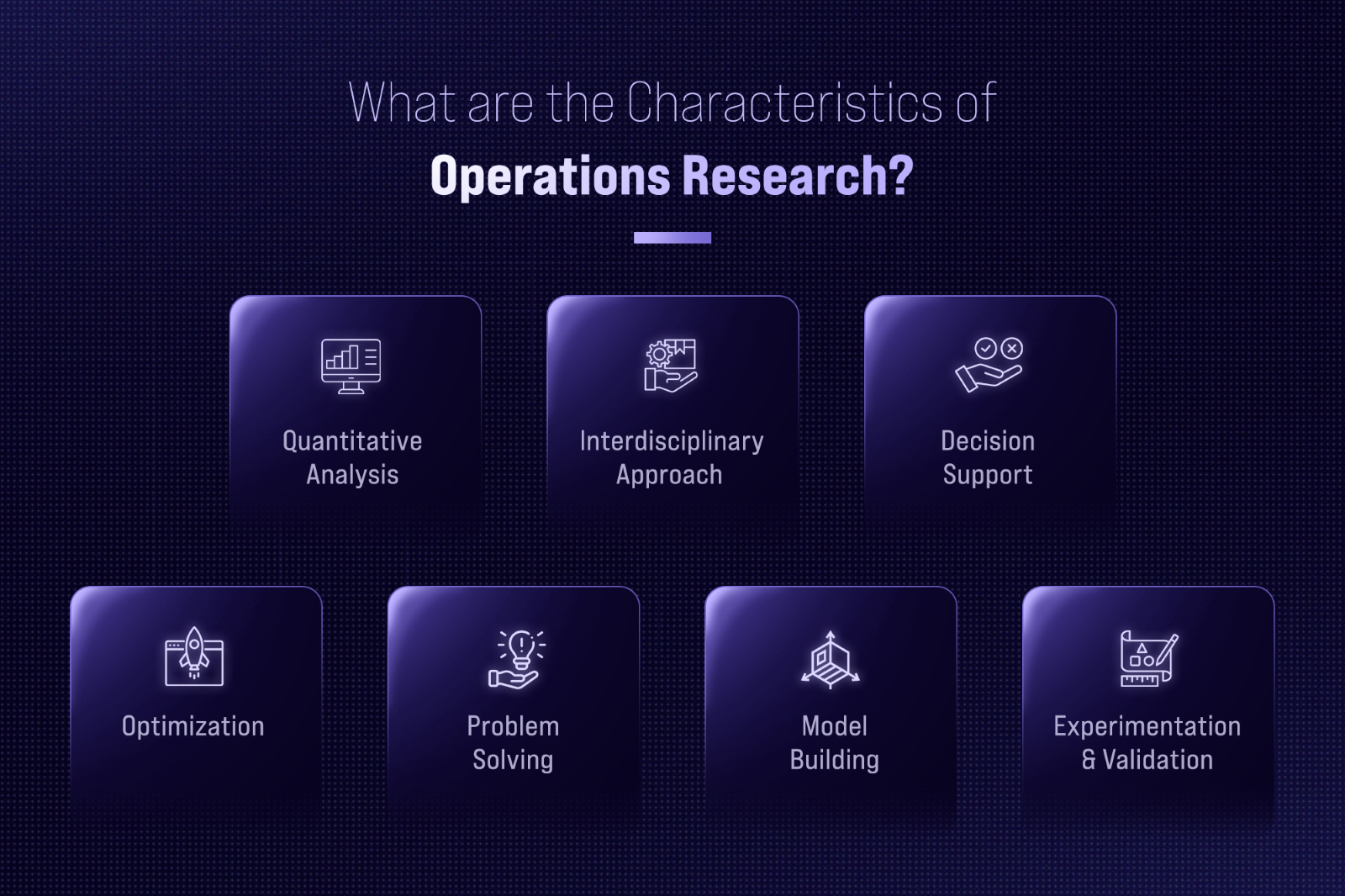What are the Characteristics of Operations Research?

Operations Research (OR) is an organized approach to solving problems and making sound decisions through the use of mathematical models, statistical analysis, and optimization. It assists organizations in increasing efficiency, reducing costs, and maximizing productivity across various industries, including manufacturing, logistics, healthcare, finance, and transportation.
Operations research is the study of complex scenarios, resource optimization, and the support of effective decision-making. At the Altera Institute, students are empowered to practically apply these techniques, thereby acquiring skills that make them career-ready and competitive in job placement. The programs at the institute are designed to equip graduates with the confidence and expertise to address real-world problems.
This article examines the nature of operations research, its key characteristics, and its limitations, providing a comprehensive understanding of its role in decision-making and optimization.
What is Operations Research?
Operations research (OR) is an interdisciplinary field that aims to enhance decision-making through the application of analytical processes. It applies computer algorithms, predictive models, and simulations to improve complex systems and workflows.
The main aim of OR is to equip organizations with evidence-based information and help them make decisions, rather than relying on intuition. It aids in the examination of problems and testing various strategic models to find the best solutions.
A shipping company can take the shortest delivery paths, which can be achieved through the application of OR principles to save fuel costs and boost customer satisfaction.

Nature of Operations Research
Operations research is characterized by its scientific and systematic approach to problem-solving. Unlike traditional decision-making processes that may be based on experience or intuition, operations research relies on quantitative analysis and logical reasoning.
Some key aspects that define the nature of operations research include:
- Goal-Oriented Approach: Operations research is concerned with identifying the most efficient solution to a particular problem through the maximization or minimization of specific objectives, such as maximizing profits, minimizing costs, or maximizing time efficiency.
- Interdisciplinary Framework: It leverages expertise from a variety of disciplines, including mathematics, economics, engineering, computer science, and strategic management, enabling a balanced and nimble approach to problem-solving.
- Data-Driven Analysis: It is highly dependent on data collection, statistical assessment, and numerical modeling to deliver informed and accurate decision-making.
- Optimization-Centric Methodology: Operations research primarily focuses on improving efficiency to determine the optimal and efficient approach in terms of resource allocation, streamlining processes, and achieving the best results.
- Experimental and Model-Based Approach: OR involves developing mathematical models and conducting simulations to test different strategies, assess their feasibility, and refine solutions before applying them in real-world scenarios.
What are the Characteristics of Operations Research?

There are several key characteristics of operations research that define its methodology and approach to problem-solving. Below are the main characteristics of OR:
Quantitative Analysis
Operations research is fundamentally based on mathematical and statistical techniques to analyze complex problems. It converts practical dilemmas into quantifiable equations, enabling businesses to base their choices on concrete data instead of hunches.
Some widely applied mathematical methods in OR consist of:
- Linear Programming – Streamlines the distribution of resources for peak efficiency.
- Queuing Theory – Examines lines and delays to refine service delivery.
- Simulation - It is a way of modeling complex systems, allowing different scenarios to be evaluated.
- Game Theory - Assists in the making of strategic decisions in competitive situations.
Through these tools, operations research ensures that judgment is rational, effective, and informed, rather than being driven by emotions.
Interdisciplinary Approach
Several areas of knowledge are combined to be used in operations research, including mathematics, economics, computer science, engineering, and management. This interdisciplinary aspect enables a multidisciplinary approach to the problem-solving process, leading to comprehensive and efficient solutions.
It draws knowledge from various fields, such as:
- Mathematics – Provides the foundation for optimization techniques.
- Computer Science – Helps in algorithm development and data analysis.
- Economics – Assists in financial modeling and cost-benefit analysis.
- Engineering – Helps optimize production processes and logistics.
Decision Support
One of the most important roles of operations research is to offer actionable insights to decision-makers based on rigorous analysis. Through analyzing possible scenarios, OR assists organizations in lessening uncertainty, determining risks, and making strategic decisions based on this information.
For example, in a retail company, OR can help:
- Determine the optimal inventory levels to minimize storage costs.
- Identify the ideal pricing approach to boost earnings.
- Enhance the logistics network to slash shipping expenses.
Through evidence-based insights, operations research improves decision-making and reduces uncertainty.
Optimization
Essentially, operations research aims to select the most efficient and cost-effective methods for achieving an organization's goals. This could involve cutting down on spending, maximizing earnings, improving processes, or utilizing optimization methods to select the most suitable approach within the available constraints.
Some of the popularly used optimization methods in OR are:
- Linear and Integer Programming - This is applied to maximize or minimize specific results.
- Dynamic Programming - Multi-stage decision problem solver
- Network Optimization - Assets maximize efficiency in logistics and supply chains.
For example, an airline company can schedule flights with the help of OR and avoid using fuel excessively, thereby eliminating delays.
Problem-Solving
Operations research breaks down complex situations into smaller and manageable units. This methodology enables organizations to identify inefficiencies, optimize their operations, and deliver effective solutions.
For example, a hospital may use OR to:
- Assign physicians and nurses effectively.
- Minimize the wait time of patients.
- Maximize the arrangement of surgery.
Organizations can successfully resolve operational problems by applying a systematic problem-solving approach.
Model Building
OR uses a mathematical model to describe problems in the real world and to conduct an experiment on different strategies. These deterministic or probabilistic models help organizations model different conditions, consider possible solutions to them, and optimize strategies prior to applying them to the real world.
Types of OR models include:
- Deterministic Models – Applied when inputs are fixed and predictable.
- Probabilistic Models – Used when uncertainty and risk are involved.
- Simulation Models – Used to test different strategies before implementation.
For instance, operations research models can be applied in manufacturing organizations to predict the efficiency of the manufacturing process and the effectiveness of different scheduling techniques before they are implemented.
Experimentation and Validation
Organizations usually use simulations and tests to prove the effectiveness of OR-based solutions before implementing them. This process makes the models realistic, dependable, and able to solve real-world problems with minimal risks and uncertainties.
For example, a retail company might run an OR model to test different pricing strategies and analyze their impact on sales before implementing the changes.
Conducting model trials ensures that solutions are reliable, feasible, and effective.
Operations Research Shortcomings

Although the benefits of operations research are multiple in decision making and optimization of processes, the research has some limitations:
- Complexity of Models: Many operations research models are highly complex and therefore difficult to comprehend, apply, and fit into real business situations.
- Relying on the Accuracy of Data: Operations research depends on the accuracy and completeness of data. Inaccurate, incomplete, or outdated data can give incorrect conclusions and poor decisions.
- Demand for Computational Power: Advanced operations research methods can be highly computational, which may require specialized software and trained experts that some organizations, particularly smaller firms, may not be able to afford.
- Poor consideration of Human Factors: Although OR excels in quantitative analysis, it may overlook important qualitative factors, such as human emotions, moral considerations, employee morale, and organizational culture, that can influence decisions.
- Implementation and Adoption Issues: The adoption of OR solutions into the current system may encounter opposition due to incompetence, organizational culture, or a reluctance to adjust conventional working practices and decision-making approaches.
These challenges notwithstanding, the application of operations research can be useful in driving efficiency, cost minimization, and making informed decisions based on data in diverse industries.
Summing Up
Operations research is a powerful field that provides scientific and data-based solutions to complicated decisions and problems for organizations. It has its limitations, though, including a reliance on accurate data, high computational needs, and implementation difficulties.
With advancements in technology and greater access to sophisticated analytical tools, the applications of operations research continue to expand across multiple sectors. Ultimately, operations research remains essential for organizations seeking to optimize operations, streamline processes, and make informed strategic decisions in a data-driven environment.





